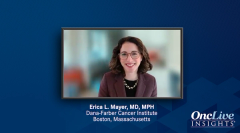
Ongoing Research and Unmet Needs in Patients With Breast Cancer and ESR1 Mutations
Drs Mayer and Kalinsky conclude their discussion with a look at agents in development and unmet needs for patients with breast cancer and ESR1 mutations.
Episodes in this series

This is a synopsis of an Insights series featuring Kevin Kalinsky, MD, MS, of Winship Cancer Institute of Emory University, and Erica L. Mayer, MD, MPH, of Dana-Farber Cancer Institute.
As the discussion concluded, Dr Erica Mayer highlighted several promising novel agents for hormone receptor-positive breast cancer beyond selective estrogen receptor degraders [SERDs]. These include proteolysis-targeting chimeras [PROTACs] like ARV-471 [vepdegestrant] and selective estrogen receptor covalent antagonists [SERCAs] like H3B-6527 which may more potently inhibit estrogen receptor signaling.
Early phase clinical data presented at recent conferences suggests meaningful single-agent activity from both investigational drug classes despite heavily pretreated populations, with manageable toxicity. Combinations also appear feasible, though some unique drug-drug interactions may require consideration, as Dr Kevin Kalinsky noted a PROTAC/CDK4/6 inhibitor regimen showed heightened neutropenia.
Dr Kalinsky was also intrigued by phase III results for the selective estrogen receptor modulator lasofoxifene from the ELAINE studies, which improved progression-free survival over endocrine options when combined with abemaciclib. The ongoing phase III ELAINE-3 trial is evaluating lasofoxifene plus abemaciclib compared with fulvestrant plus abemaciclib specifically in patients harboring ESR1 mutations who progressed on prior CDK4/6 blockade. Demonstrating efficacy in this post-CDK4/6 setting could support a differentiated approval.
In closing, Dr Mayer emphasized practical challenges to integrating comprehensive genomic profiling for targetable alterations like ESR1 mutations into real-world practice. Overcoming barriers to accessible, serial ctDNA testing is imperative to realize the full potential of emerging biomarker-driven breast cancer therapies. Drs Kalinsky and Mayer urge focused education and implementation efforts surrounding ctDNA analysis to evolve the standard of care.
*Video synopsis is AI-generated and reviewed by OncLive editorial staff.






































